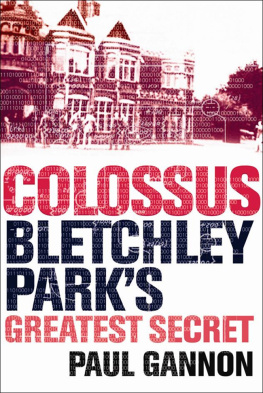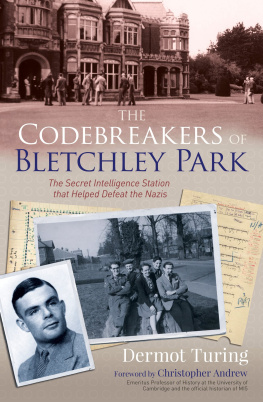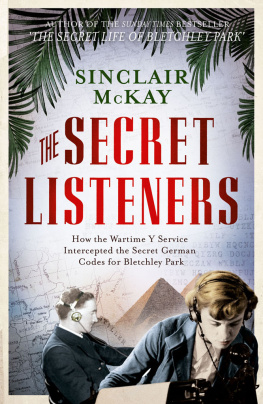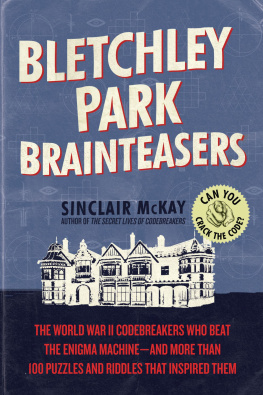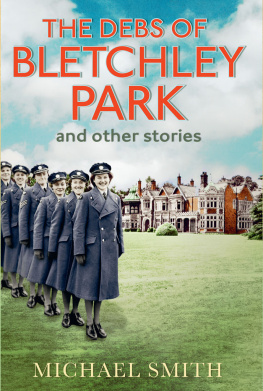COLOSSUS
Paul Gannon is a writer on all aspects of information and communications technology. He is the author of Trojan Horses & National Champions: A History of the European Computing and Telecommunications Industry (IT Book of the Year, 1997).
Paul Gannon has revealed a previously untold story Colossus tells of the heroic efforts of the inventors and mathematicians [who] received no recognition for decades Gannon sets the record straight. Simon Singh, The Times
A fascinating tour through the history of Colossus for the general as well as the technical reader a succinct overview of codes and ciphers in modern warfare. Andrew Dodgshon, Tribune
Gannon makes commendable efforts to explain the intricacies of code-breaking and to those with an interest in mathematics, there is a large amount of rewarding detail. For the general reader, the explanation of the wider picture is a fascinating insight into a neglected area. Eibhir Mulqueen, Sunday Business Post
First published in Great Britain in 2006 by Atlantic Books,
an imprint of Grove Atlantic Ltd
This edition published in Great Britain in 2014
by Atlantic Books Ltd.
Copyright Paul Gannon, 2006
The moral right of Walter Russell Mead to be identified as the author of this work has been asserted in accordance with the Copyright, Designs and Patents Act of 1988.
All rights reserved. No part of this publication may be reproduced, stored in a retrieval system or transmitted in any form or by any means, electronic, mechanical, photocopying, recording, or otherwise, without prior permission both of the copyright owner and the above publisher of this book.
Every effort has been made to contact copyright holders. The publishers will be pleased to make goodany omissions or rectify any mistakes brought to their attention at the earliest opportunity.
ISBN 9781782394020
A CIP catalogue record for this book is available from the British Library.
Atlantic Books Ltd.
Ormond House
2627 Boswell Street
London WC1N 3JZ
www.atlantic-books.co.uk
For Frances and Mackie
Contents
A Word about Words
A ny account of the birth of Colossus and the computer age must involve three particularly jargon-ridden subjects information and communications technology, codebreaking, and military history. I have tried not to be too pedantic in the use of jargon, preferring to use everyday words wherever possible, which has meant simplifying some technical terms. I have also tried to use contemporary rather than modern terminology. Occasional notes in the text will point to variations and possible confusions.
One particularly hard decision was what to call the units of the Baudot code (see ). Telecommunications engineers called them units, but during the Second World War the British codebreakers used the term impulses. After the war, the term bit (from BInary digiT) came into universal use. In many ways, it would have been easiest to use the now familiar bit, but it creates a false historical impression (in its use before its time). As impulse is potentially confusing, I have used unit throughout.
Codebreaking, in particular, suffers from problems of terminology. Codebreaking is itself a good example. It clearly means breaking a code, but it is also widely used to mean cipher breaking (which can also be called cryptanalysis). Codes and ciphers are generally different things (see ).
Introduction
T owards the end of the Second World War, civilian and military staff who had been employed at Britains highly successful codebreaking organization the Government Code and Cipher School (GC&CS), based at Bletchley Park, were all advised that, even after the end of hostilities, they were bound to secrecy about their wartime work. Bletchley Park had been the centre of a massive interception and codebreaking operation that had helped the Allies win the war. Decrypts of German enciphered military messages, revealing strategy and tactics, had been passed to Allied operational commands from as early as 1939 under the name of Ultra. By and large, there were no serious security breaches during the war and, despite the occasional scare, the German armed forces remained wholly unaware of the extent of Allied codebreaking. Now it was essential that tight security be maintained.
The staff were told, The end of the German war is now in clear view. The several strands of keenness, discipline, personal behaviour and security have been admirable and have combined to produce a direct and substantial combination in winning the war. However, there were still things to do: the war against Japan had to be won; there was the need to ease the transition from war to peace for everyone; and, most important of all, it was essential to ensure that nothing we do now shall hinder the efforts of our successors I Another document was more forceful: All persons concerned must remember that they are bound by honour as well as law to maintain secrecy of Ultra in Peace as well as in time of War. Not even their husbands (the majority of GC&CS staff were women) or, for that matter, their wives could be told. The most severe penalties would follow if anyone so much as dared to publicize what they had done or seen. A trial, with a complete ban on any reporting of it, would end with a very long prison sentence and a sorry future.
Naturally, the wartime secrecy was essential any hint that Britain and the United States were successfully decoding German signals would have led to a tightening of German wireless security and the loss of the intelligence the Allies gleaned from the intercepted messages. Yet the blanket ban was to be held in place for nearly three decades and, during that entire period, histories of the Second World War were written without any awareness of how the Allies managed to achieve some of their most significant victories. The comprehensive history of codes, ciphers and decryption remains Codebreakers, a massive tome written by the American historian David Kahn. Kahn records in conscientious detail the activities of codebreakers through the ages, culminating with the world wars of the twentieth century, and in the first edition of the book, published in 1967, he reported on how, in the Second World War, Some of the most important British communications intelligence resulted, however, not from the scribblings and quiet cogitations of reticent cryptanalysts, but from the explosive sexual charms of a British secret agent in America.century, spies, regardless of their sexual charisma, have been far less productive than backroom codebreakers in providing intelligence to both the military and governments a notable exception, perhaps, being the success enjoyed by the Soviet Union in recruiting agents in both Britain and America. Yet such tales of voluptuous agents made more attractive reading and, more importantly, they led the trail away from codebreaking. For interception and decryption operations were undergoing a massive and continuous growth as the Cold War intensified, with nuclear weapons presenting a threat to humanity many times greater than any posed by even Hitler at his most rampant, and those running these operations were determined that the whole subject must remain wholly secret or see its usefulness destroyed.
But hints that the German Enigma cipher machine had been broken eventually started to come out abroad, beyond the jurisdiction of Britains Official Secrets Act. In Poland and France, the few individuals aware of the essential contributions made by Poles and the French to cracking the Enigma machine were no longer willing to remain silent. And a sort of reverse pride was at work in Italy, where, unlike in Britain, you can be prosecuted for libelling the dead. The Italian navy had long simmered with anger at accusations by the Germans that it had allowed a spy to acquire the information that led, in 1942, to a successful attack on Italian naval ships that had been intended to supply German troops in North Africa. The Germans blamed the incident on a spy who used sex to gain information from a fallible Italian admiral, who in due course died. In the early 1970s, when the admirals surviving relatives threatened to sue for libel the author of a book that repeated these charges, it seemed likely that the whole codebreaking story would start to emerge. And, indeed, once speculation about whether the Allies had broken Axis codes began to surface in books published in Germany, as well as in France, Poland and Italy, the wall of secrecy built up around the whole affair began to crumble.

